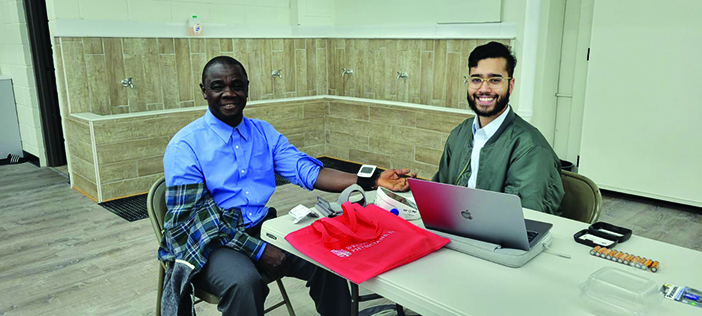The Brown medical community offers health guidance to local Muslims and colleagues for the holy month.
Ramadan, the roughly annual, month-long period of fasting, prayer, and celebration observed by Muslims worldwide, is underway through April 20. Though the fast requires abstaining from food, drink, and oral medications from sunrise to sunset, tens of millions of people with health conditions like diabetes or high blood pressure are able to safely follow the practice.
Islamic law exempts certain individuals from fasting—such as young children, sick patients, and breastfeeding or pregnant people if it could endanger their or their baby’s health—but many choose to do so anyway. By consulting with their physician, they may be able to do so safely, says Bazif Bala ’22 MD’26 ScM’26.
“Fasting is not just a physical experience,” Bala says. “It’s also a very profound spiritual experience. It’s important for mental health.” That’s why, he says, physicians caring for Muslim patients should try to understand the significance of Ramadan and, rather than tell a patient, “don’t fast,” work with them to manage their condition during the holy month.
Surveys have found that approximately 80 percent of Muslims in the US fast, including 80 percent of those with diabetes. “Obviously, a lot of people are figuring out how to make it work,” he says.
Bala was one of several Brown medical students, residents, and faculty who gave local presentations about fasting and health prior to Ramadan. Assistant Professor of Medicine Ibrahim Yusuf Abubeker RES’22, MD, helped to organize the first-ever series of talks: a preclinic conference for internal medicine residents at three sites; and two community outreach events, at Dorcas International Institute of Rhode Island, for local refugees; and at Masjid Al-Kareem, the Islamic Center of Rhode Island.
Abubeker is from Ethiopia and completed his medical education and training in Turkey and Qatar—all majority-Muslim countries. Where fasting is the norm, “we take things for granted,” Abubeker says. “We never were given a course or a training [about]when fasting comes, these are the medications you need to change, these are the things you need to do.”
In Western countries where Islam is less prevalent—it’s practiced by about 1 percent of US adults—this lack of communication could be harmful. In their curriculum for residents, Abubeker and his colleagues explained how simply telling a patient with diabetes not to fast was inappropriate; instead they discussed how to assess the patient’s risk, adjust the timing of their medications (injectable insulin does not break the fast), and monitor their glucose.
The community presentations included advice on exercise and healthy eating. Many foods eaten during Ramadan are high in fat or sugar, and despite fasting some people actually gain weight. “So have the sambusa, but add the side salad, even if you don’t want to,” Bala says. They also advised anyone with a health condition to meet with their provider before Ramadan—news to immigrants from countries without a tradition of primary care or preventive medicine—and offered to connect audience members with a PCP if they didn’t have one.
“What we told them was, you can fast if you want to fast, but we advise if you are high risk to reconsider. But this should be a decision between your physician and your Islamic scholar,” Abubeker says. “We also told them our job is not to tell you ‘fast’ or ‘don’t fast.’ Our job is to help you fast successfully.”
Many Muslim refugees have fled war or dictatorships, he explains. “All their life they’ve been told to do things or don’t do things. … The last thing they want to see is [some physician who]tells them, ‘don’t do this,’” Abukbeker says. He told residents at their presentations, “You’re not an Islamic scholar. … They may respect your medical knowledge, your expertise, but … they don’t know who you are.”
“It is so important for physicians to be culturally competent and also trauma informed,” adds Bala, a student in the Primary Care-Population Medicine Program who has volunteered with refugees throughout his time at Brown. “This also impacts mental health. This also impacts spiritual health.”
At the community presentations, Bala quickly learned that the “nuances of fasting” were not the primary concern for many in the audience. “It was, ‘Where do I get halal food in Rhode Island?’ ‘Where do I break my fast?’” he says. “These folks don’t know that there are local mosques providing free breaking-of-the-fast meals … and they’re really nutritious.”
Abubeker recalls how one audience member, after being told what complex carbohydrates to eat, told the presenters that he couldn’t afford the foods they were suggesting. “He’s right,” Abubeker says. “We were caught off guard.” Instead of continuing their planned talk, they pivoted to discuss local resources, and resolved to offer more comprehensive information—and free food baskets—at next year’s presentations.
Ramadan is a time of gathering, celebration, and shared sacrifice, and can feel lonely for new immigrants. Abubeker hopes this year’s presentations were just the first step of building trust and physician-patient relationships in Rhode Island’s small Muslim community.
“Remembering people who cannot have food, and that’s what you’re fasting for—that gives you some sense of gratitude for what you have,” he says. “Then when you see people do the same thing, you feel empowered and [that you]belong somewhere.”




